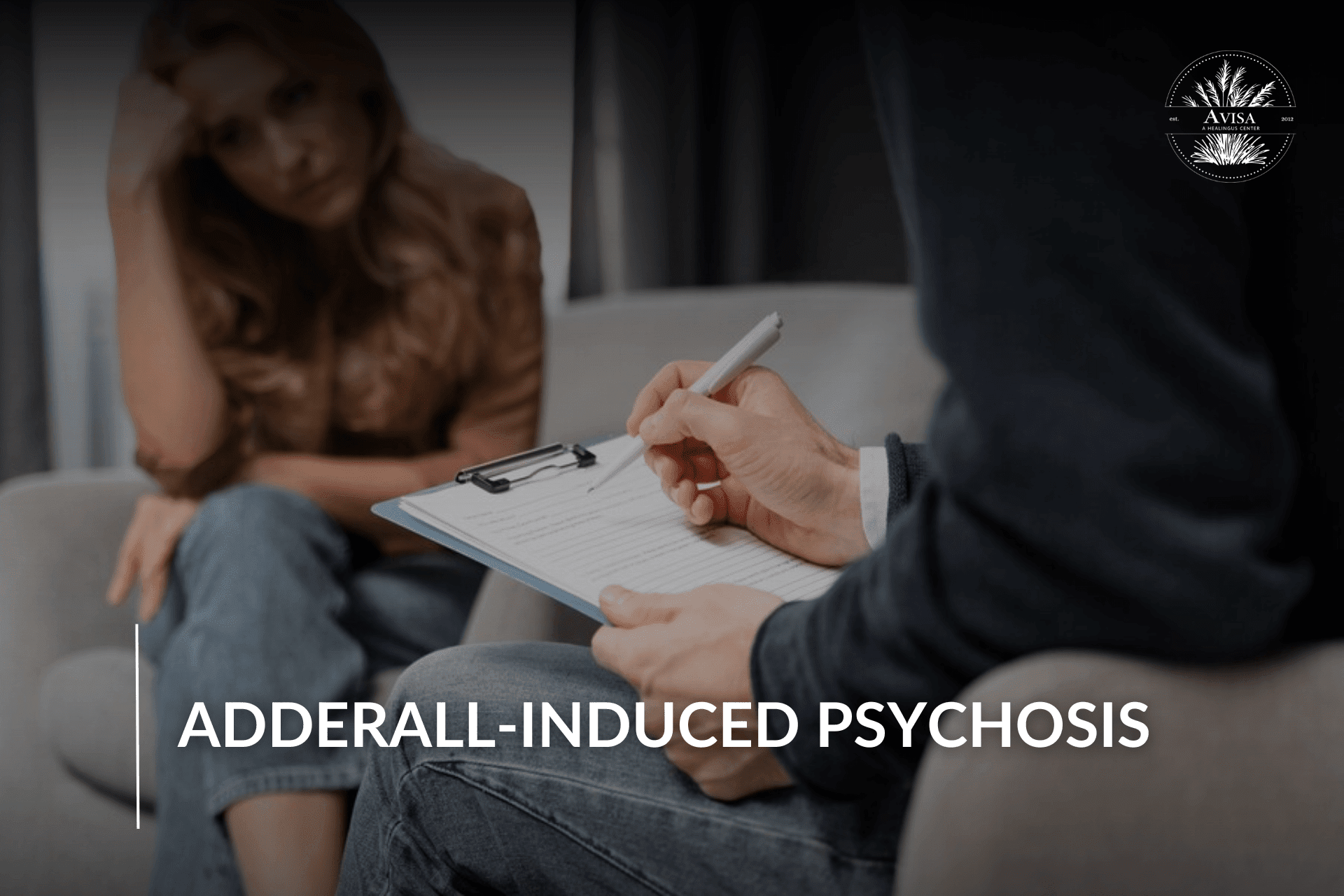Adderall is often seen as something that can magically transform your condition and make you happier, more focused, and better. But imagine feeling as though the walls are closing in, hearing whispers that aren’t there, or believing in dangers that don’t exist. This is a devastating reality for those who experience an overdose of Adderall and psychosis together.
A detachment from reality, disordered thinking, delusions, and hallucinations, mood disturbances are what Adderall-induced psychotic behavior looks like. Research shows that individuals taking high doses of Adderall face more than a 5X increased risk of psychosis.
This blog can help you understand the symptoms, consequences and treatment options for dealing with Adderall and psychosis.
Escape the Nightmare of Adderall Psychosis!
With CBT, supportive care, professional guidance, and the right medications, healing is not just possible, but it’s waiting for you.
Adderall and Psychosis: What’s the connection
Psychosis is a condition where the person loses touch with reality, manifesting hallucinations, delusions, difficulty managing emotions, withdrawal, and disorganized thinking. Adderall, which is prescribed primarily for ADHD and narcolepsy, can heighten or induce psychosis or make it worse. Here are some of the reasons for the same:
- Adderall is known to increase dopamine and norepinephrine levels, heighten mood, and provide a constant stimulus to the body. Overdoses can lead to euphoria, increased energy and, ultimately, symptoms of psychosis.
- This is proven to affect individuals with pre-existing mental health conditions like schizophrenia, bipolar disorder, anxiety, depression, etc.
- Abrupt discontinuation of Adderall may lead to withdrawal symptoms like anxiety, depression, lack of focus and motivation to do things and ultimately to psychosis if not treated well.
Symptoms of Adderall-Induced Psychosis
Adderall and psychosis can occur together and may cause serious mental health conditions that might be difficult to handle. Here are some of the symptoms of Adderall-induced psychosis that can impact the behavior, perception, and thinking processes of an individual:
- Seeing things, hearing sounds, and feeling sensations that don’t exist.
- Living in delusions, assuming a great soul in yourself.
- Overthinking about people and situations to the point where they start to overwhelm an individual.
- Increased incidents of disorganized thinking where the individual lacks logic and is unable to form meaningful conversations.
- Super elevated mood and excessive energy that becomes unmanageable.
- Difficulty in sleeping patterns
Causes of Adderall-Induced Psychosis
The main cause of Adderall and psychosis occurring together is the stimulant effects of the drug disrupting brain chemistry and ultimately leading to symptoms of psychosis. This is a rare side effect, but several factors can increase its likelihood. Here are the main causes:
1. Overdoses of Adderall
Everything consumed within the limit and as required can elevate your situation and make it better. On the contrary, overdoses can lead to significant downfall and ultimately to mental health problems, psychosis being one.
2. Adderall Misuse
Injecting or snorting Adderall without a valid prescription can amplify the drug’s effect on the body and raise the risk of body toxins and psychosis.
3. Mixing various drugs
Adderall, when combined with toxic substances like alcohol, recreational drugs, and medicinal drugs, can cause significant harm to the body and mind, leading to side effects like psychosis and depression.
4. Withdrawal symptoms
Once the brain is fully dependent on Adderall for dopamine and norepinephrine, leaving the doses abruptly can lead to various withdrawal symptoms like anxiety, fatigue and psychosis.
5. Sleep deprivation
Adderall increases the hormones responsible for wakefulness and increased energy. If not consciously taken care of sleep, this can lead to adverse effects like hallucinations and delusions.
Treatment options for Adderall-Induced Psychosis
1. Antipsychotic Medications
Antipsychotics like olanzapine, risperidone, quetiapine) can help control serious symptoms of psychosis like hallucinations, delusions, and agitation on a temporary basis until the symptoms resolve.
2. Addressing the core mental health challenges
If the individual has a pre-existing mental health condition like anxiety, depression, schizophrenia, or bipolar disorder), treating them on priority is important.
3. Cognitive-behavioral Therapy
CBT can help individuals process the experience of psychosis and manage residual anxiety or paranoia, also addressing underlying conditions like substance misuse and withdrawal symptoms.
4. Supportive Care
Restoring a healthy lifestyle can help tackle one’s mental health conditions based on individual requirements. Adjusting sleep patterns, eating a balanced diet, using relaxation techniques such as meditation, yoga, or breathing exercises and reaching out to family, friends, or support groups can provide emotional and practical support during recovery.
5. Seeking professional help
Making yourself aware and educating yourself in this domain might be helpful even for the long-term; hence, reaching out to practitioners and professionals is important instead of self-diagnosing.
Tired of fighting addiction and mental health struggles?
Ignoring both deepens the struggle. Our holistic approach—detox, therapy, and medication-assisted treatment—can help you heal. Take the first step today.
FAQs
Q: Can ADHD trigger psychosis?
A: ADHD itself doesn’t typically cause psychosis, but co-occurring conditions or stimulant misuse may increase the risk.
Q: Does Adderall increase psychosis?
A: If already diagnosed with psychosis, Adderall can increase the symptoms, particularly at high doses or in individuals with a predisposition.
Q: What are the symptoms of a psychotic break?
A: Hallucinations, delusions, paranoia, disorganized thinking, and loss of reality are some of the common symptoms of psychosis.
Q: Can Adderall trigger a manic episode?
A: Yes, Adderall has proven to trigger mania in individuals with bipolar disorder or a predisposition to mood disorders.
Q: How do we deal with the adverse effects of Adderall and psychosis?
A: Treating Adderall and psychosis hand-to-hand can increase problems, but stopping or adjusting Adderall, managing symptoms with antipsychotics, and seeking psychiatric care are some of the first principles to start with.
How Can Avisa Recovery Help You?
Dealing individually with Adderall and psychotic disorders can be incredibly distressing, affecting individuals and their families profoundly. Combining them is a rare condition, but if it occurs, it can have serious complications for one’s mental health. Getting the right help at the right time is extremely important. At Avisa Recovery, we understand this situation, and hence, our team of reliable professionals provides complete and compassionate care and steers you toward recovery and well-being.











